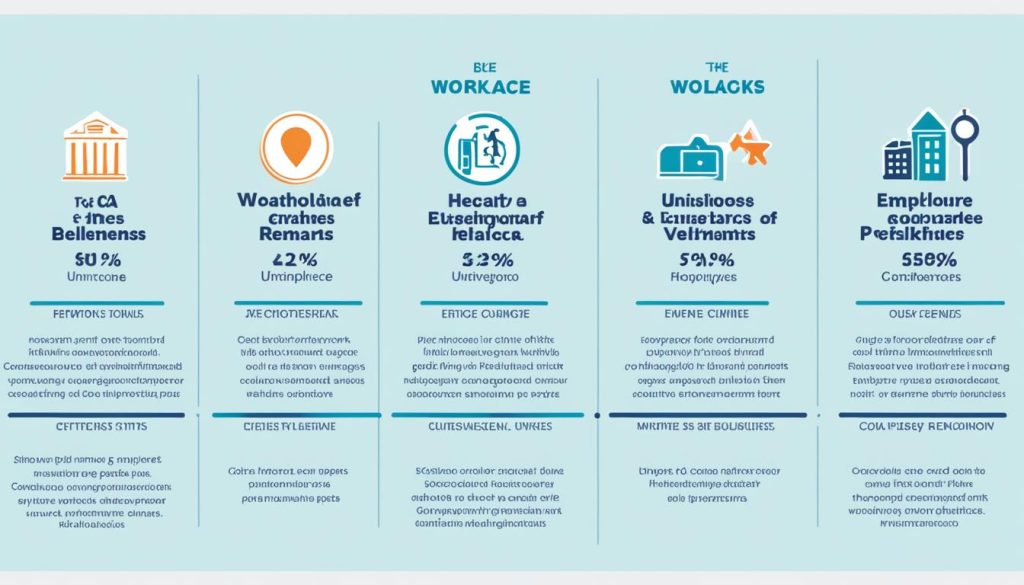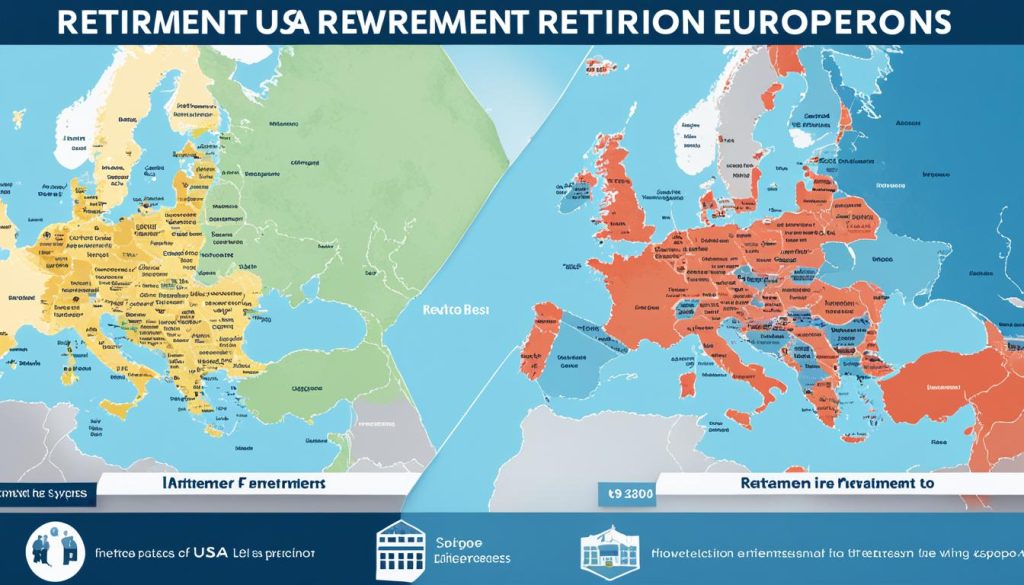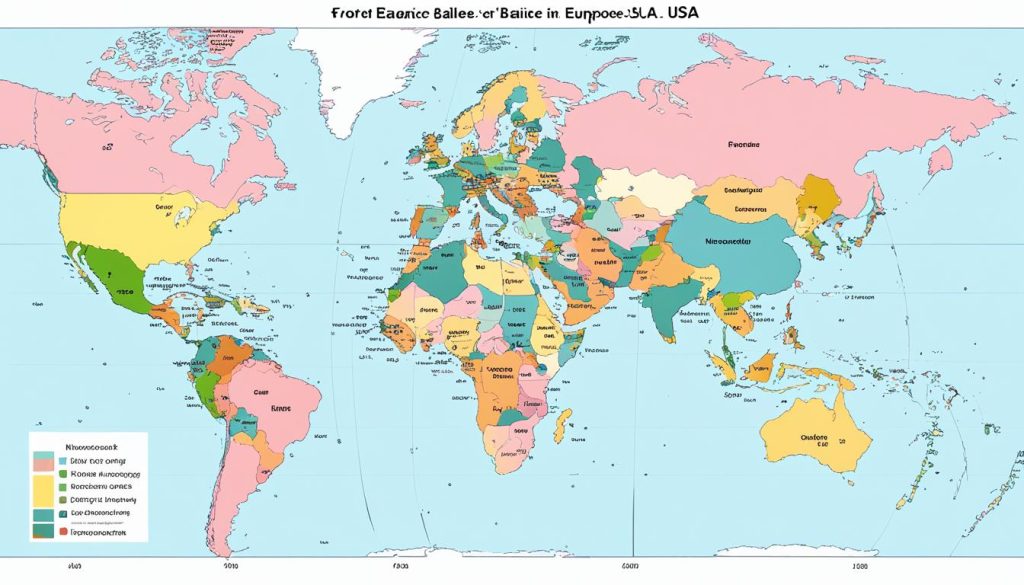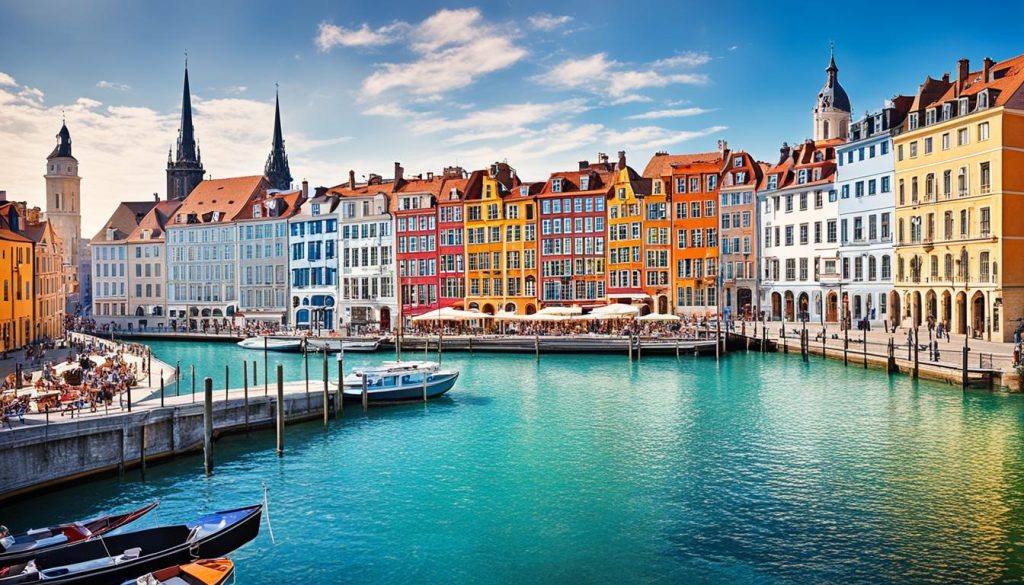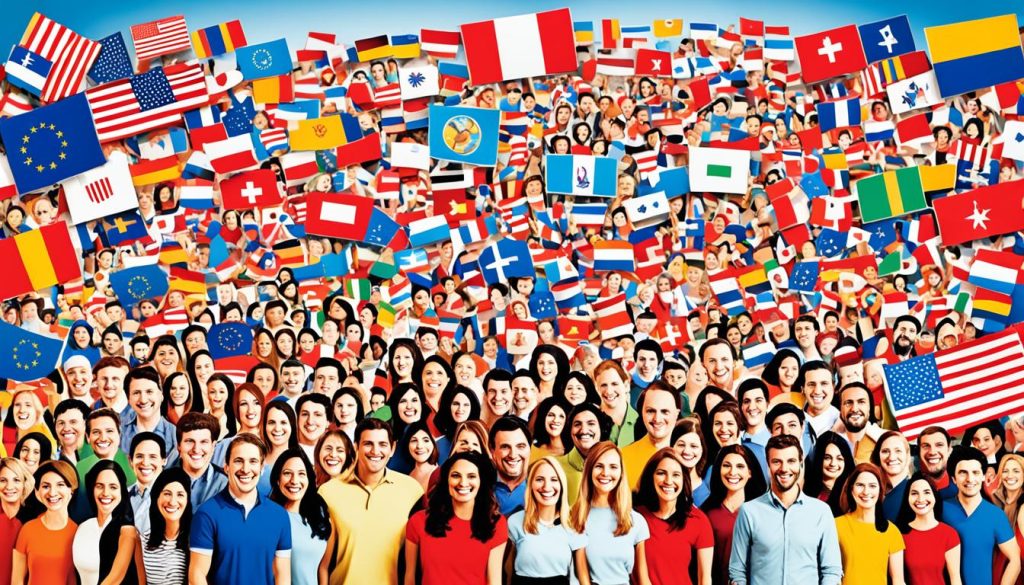Moving to a new country can be a big change, especially when comparing life across the Atlantic. This article will help you understand how living and working differ between the USA and Europe. Each place offers unique environments for personal and professional life.
- Introduction to Transatlantic Lifestyles
- Understanding Cultural Variations
- Cost of Living Comparisons
- Employment Opportunities
- Working Conditions and Employee Benefits
- Social Security Systems: USA vs Europe
- Quality of Life Indicators
- Compare USA and Europe
- Diversity and Multiculturalism
- Housing and Real Estate
- Education Systems and Opportunities
- Immigration Policies: Access and Integration
- Personal Freedom and Safety
- Conclusion
Many people are curious about job differences between these continents. We want to help those thinking of moving. This guide will give you detailed information on what to expect, helping you prepare better for this big step.
Choosing where to live and work – in the USA or Europe – is a big decision. This article looks at the cultural, economic, and social differences between the two. Let’s explore what it means to live on either side of the Atlantic, helping you decide on your next adventure.
Introduction to Transatlantic Lifestyles
Living as an expatriate offers varied experiences and challenges. Deciding to live away from your homeland, it’s vital to grasp the mix of cultural habits, living conditions, and small details you’ll face. Many find themselves between American cultural experiences and life in Europe, filled with a rich heritage.
It could be the energetic cities of Europe or America’s vast landscapes that call you. Moving abroad is an adventure full of transatlantic differences. These differences aren’t just about place. They’re in everyday life, affecting how we socialise and work.
Here are essential things to think about if you’re considering a transatlantic move:
- Cultural Nuances: Expect a mix of traditions, languages, and histories.
- General Living Conditions: Be ready for different living standards, from busy cities to peaceful countryside.
- Social Interactions: Learn the various etiquette and social norms.
- Work-Life Integration: Notice how work, leisure, and family life balance differs.
The next chapters will dive deeper into these aspects of transatlantic life. They aim to highlight the similarities and differences that enrich an expatriate’s experience.
Understanding Cultural Variations
Exploring how cultural differences exist between European and American societies shows varied social norms. These norms dictate daily life and how people interact. The debate on culture between the USA and Europe is complex, with clear differences in values and traditions.
In the United States, individuals highly value independence and success. This focus differs greatly from some European views that stress community and togetherness. These core beliefs affect everything from work habits to family roles.
The approach to work and free time also shows these cultural contrasts. Americans often adopt a ‘work hard, play hard’ attitude. This can mean less leisure time and more hours working. Europeans tend to value a slower pace, taking more holidays and prioritising work-life balance.
- Communication styles also differ widely. Americans typically are upfront and bold, while Europeans may be more formal and reserved, especially in the north.
- Traditions vary too. America’s diverse heritage leads to a mix of cultural practices. Europe’s customs, meanwhile, are deeply rooted in its long history and distinct regional identities.
Cultural aspects deeply influence how societies operate, including politics and how people relate to each other. Understanding these differences is key. It’s crucial for bridging the gap across the Atlantic, no matter your reason for interest.
Cost of Living Comparisons
Thinking about moving across the pond? It’s key to look at the cost of living first. Knowing what expenses you’ll face is crucial, whether moving from the USA to Europe or the other way. We explore all angles, from how much houses cost to healthcare expenses. By comparing costs in these areas, we help with your financial planning.
Accommodation Costs
For many, housing eats up the biggest part of their budget each month. The affordability of homes varies a lot between the USA and Europe. This is mostly because big cities have high demand and limited space. Cities like New York and San Francisco are pricy, while places like Berlin and Madrid are easier on the wallet. However, London and Paris can be expensive. Deciding whether to rent or buy depends on market conditions and your own long-term plans.
Everyday Expenses
- Groceries: The price of your food shop matters a lot for your daily budget. What you pay for food can change based on where it comes from and taxes on imports.
- Utilities: Bills for electricity, water, gas, and internet are part of monthly costs. These can vary with the weather, how much you use, and how good the providers are.
- Transportation: The cost of owning a car, fuel, or using public transport affects your spending. Europe’s good public transport means less need for a car, compared to many places in the USA.
Healthcare Expenditure
Healthcare costs are a big deal when looking at living expenses. Unlike many places in Europe with universal healthcare, the USA can be expensive. Americans might face big bills for medical care and medicines. This difference in healthcare costs can greatly influence your spare money in the USA. This shows why healthcare is a must-consider in cost of living studies.
Employment Opportunities
When you think about moving across the Atlantic, consider the job scene. The USA and Europe have different work prospects. In the USA, there are plenty of chances to grow your career. Europe, on the other hand, offers a great work-life balance and strong support for workers. Understanding the job market and entrepreneurial opportunities is key before moving.
Job Market Dynamics
In the USA, jobs come with the chance to move up and change paths. There are lots of jobs in tech, healthcare, and finance. Europe’s job market is more stable thanks to strict employment laws. This stability is something workers in Europe really value.
- Exploring the impact of technology on job creation and automation.
- Analysing the role of healthcare as an evergreen job market in both economies.
- Examining financial services as a major contributor to economic robustness.
Entrepreneurship Prospects
Many dream of starting their own business in the USA or Europe. The USA is known for taking risks and has lots of venture capital for new businesses. Europe might seem less risky but has a strong network to support small businesses. It’s also home to many successful start-ups, showing how rewarding it can be.
- Assessing start-up incubators and their role in nurturing new businesses.
- Comparing access to venture funding in the USA and Europe.
- Understanding regulatory environments and how they influence business creation.
Working Conditions and Employee Benefits
The workplace in the Atlantic has varied employee rights and job benefits. In the USA and Europe, workers deal with different labour laws. These laws influence their work life and vacation time.
To understand employee conditions, we must examine the laws and practices. Europe often has more vacation time than the USA, showing a focus on balancing work and life. In terms of maternity leave, Europe usually offers more time off, unlike the USA, which lacks a federal paid leave policy.
- Labour Laws: European laws usually protect workers more than American laws. They include rules about job termination and limit at-will employment.
- Job Benefits: In Europe, health care often comes from the government. In the USA, health benefits are mainly through jobs and differ a lot.
- Employee Rights: Union strength and the right to bargain vary. European workers often have stronger unions.
- Vacation Entitlements: Europeans generally get at least four weeks of paid vacation. Americans usually get less, as there’s no fixed minimum.
Creating a good work environment involves more than just meeting legal needs. Employers in both areas are seeing the value in better job benefits. These include flexible hours and health programs to keep and attract skilled people. Still, the way American and European laws view work and free time is quite different.
In Europe, the focus is often on work-life balance, whereas in America, the laws usually give more power to employers. Despite these views, the global talk on employee wellbeing is growing. This conversation aims to improve labour laws and rights for workers everywhere.
Social Security Systems: USA vs Europe
The social welfare systems are complex but essential to understand. They show how the US and Europe help citizens at different life stages. These systems, including social insurance and job security, play a key role. They keep individuals and families secure. Let’s look at how these systems work in the US and Europe. They show different values and how involved the state is in personal welfare.
Pensions and Retirement
Thinking about the future and retirement is vital. The US often uses private savings plans like the 401(k). But European countries usually have stronger public pensions. In Europe, people’s contributions fund pensions that give them a safety net later. In contrast, Americans have to save more themselves for retirement.
Unemployment Support
- Unemployment support shows how much a country cares for its workers. The US has unemployment insurance to help those between jobs. But this help varies by state.
- European nations, however, tend to give more to those out of work. Some even provide an ‘unemployment dole’ for a basic living until new work is found.
Family and Maternity Leave
- Parental leave tells us how much a society values family. The US lacks a federal paid maternity leave, pushing many to depend on employers or go unpaid. Europe, however, offers more parental leave—paid maternity, paternity, and parental leaves are common.
- This shows Europe’s commitment to supporting parents. It ensures they can bond with their newborns without rushing back to work.
Quality of Life Indicators
Looking at quality of life means going beyond just money. It’s about health, education, and work-life balance. These are key to feeling good about life, no matter where you live. They shape our daily experiences.
Healthcare Quality
People often discuss public health care passionately. It’s all about getting good care, easily and at a fair price. The USA has top-notch medical tech but faces issues with insurance costs. In contrast, European countries are praised for their healthcare that’s available to everyone. This makes a big difference in how happy and healthy people feel.
Education Standards
Good education is vital for a community to thrive. In the USA, universities are world-renowned. But the quality of schools can vary a lot. Europe, on the other hand, has more consistent schooling. There’s a big focus on languages and global perspectives. This really helps in raising living standards.
Work-Life Balance
Being productive at work is important, but so is having time to relax. In the USA, the work culture often means fewer holidays and more stress. This can affect our happiness. European countries, however, promote a balance. They give more time for leisure and family. This could be why people in Europe might be happier with their lives.
Compare USA and Europe
Looking at environmental sustainability and travel systems shows us a lot about the USA and Europe. Both have different landscapes that greatly affect how people live. This comparison is interesting and important.
Climate and Environment
The USA and Europe have many climate zones, which change how people live and build. From sunny beaches in California to cold fjords in Norway, these places are varied. It’s vital to keep these areas safe for the future.
Travel and Mobility
You could be driving on America’s Route 66 or taking a fast train in Europe. The way we travel in these regions is different but connects us. Europe is known for its trains, while the USA loves its roads and planes. This tells us a lot about how people move in these places.
Diversity and Multiculturalism
The USA and Europe are rich in cultural diversity. They are like vibrant mosaics where each culture adds something special. This diversity shapes their national identities and how communities interact.
Both continents have seen a rise in immigrants. This mix of cultures leads to both challenges and new chances. How well societies include different cultures shows how strong and rich they are.
- Encouraging inclusion isn’t just good for society—it also boosts innovation and the economy.
- Policies that support multiculturalism make people feel they belong, easing social tensions.
- Programs that promote understanding between cultures are essential for respect.
Diverse societies gain a lot. They enjoy cultural perks like arts and food, and see gains in business and trade. This comes from having people who understand different cultures.
The journey toward multicultural harmony in the USA and Europe is ongoing. They see diversity as a source of strength and creativity, not division. This outlook is key to future success, bringing benefits to everyone.
Housing and Real Estate
Finding a home plays a big part in seeking financial security and stability. We need to grasp the complex laws around buying homes in various countries. These laws make the choice to rent or buy not just about money or lifestyle, but also about legal issues.
Property Ownership Laws
The rules for owning property differ greatly between the USA and Europe, impacting home ownership and investing. In the USA, it’s easier to buy and sell property thanks to helpful mortgage options. Europe, however, has a tangled set of laws that make investing in property a careful decision.
Renting vs Buying
Deciding between renting and buying is crucial, with the rental markets varying widely in the US and Europe. Europe offers more protections for renters, leading to greater security. Yet, many in the USA still see owning a home as key to wealth.
Choosing to rent or buy involves looking at immediate needs versus future benefits. Renting allows for easy moves, but buying might increase your wealth over time. These decisions reflect larger economic trends and local laws that influence housing choices.
The real estate market reflects what society values, from the American view of owning a home as wealth to Europe’s focus on stable communities through renting. It shows the varied ways people view living and investing, shaped by different laws.
Education Systems and Opportunities
Exploring education in the US and Europe reveals how it shapes young minds and their future. We look at schooling quality, the status of universities, graduation rates, and the appeal of studying overseas. This journey helps us understand the impact of education on students’ lives.
Primary and Secondary Education
In the US and Europe, schools build the foundation for kids’ success. Europe provides state-supported education, focusing on quality for all. Schools from the UK to Finland work hard to ensure every subject is taught well. Meanwhile, the US offers a variety of subjects and activities, but the quality can vary because local areas control schools.
Educational achievements are key to better job prospects and contributing to society in both regions. By looking at test scores, like PISA, we can see how effective teaching methods and curriculums are in different places.
Higher Education Comparisons
- University Rankings: The world watches these rankings for signs of academic greatness. The US has many top-ranked universities known for their research. Europe’s old universities are famous for their thought leadership and now, their research too.
- Educational Attainment: Getting a higher education is a goal for many. It prepares graduates for the workforce, with each area offering unique higher education experiences.
- Study Abroad Opportunities: Universities in both America and Europe offer programs to study in other countries. These opportunities expand cultural understanding and encourage the exchange of ideas across borders.
The US and Europe enhance their education systems with apprenticeships, lectures, and online classes. These systems are linked to each society’s culture and economy, shaping the opportunities available to students around the globe.
Immigration Policies: Access and Integration
Going through immigration procedures can be hard for those moving to a new place. The US and European countries have different visa requirements. They cater to work, study, family reunification, and asylum, among others.
Integration programs are crucial to help newcomers blend into society. They allow immigrants to add value to new communities while keeping their culture. These programs lead to dynamic and mixed expat communities, showing the successful mix of cultures and ideas.
- Visa Application Process: Detailed guidance on how to approach the complex visa application process from documentation to interview.
- Residence Rights: Understanding one’s rights regarding long-term residency and the pathways to permanent settlement.
- Language and Cultural Orientation: Opportunities to learn the local language and understand societal norms which are essential for integration.
- Networking with Expats: How to connect with expat communities that provide a sense of belonging and support in a foreign land.
Knowing about the points mentioned can help individuals get ready for immigrating, adapting, and becoming part of their new home. It’s through navigating immigration procedures and connecting with expat communities that the true experiences of living across borders come to life.
Personal Freedom and Safety
People all over the world think about life in other places, especially about how free and safe they feel. Deciding to move or just visit, it’s key to know about policing and privacy in the USA and Europe. This knowledge sheds light on each society’s core values.
Crime Rates and Law Enforcement
When it comes to safety, there’s a lot of different info out there. Big cities in the USA might feel more dangerous than many places in Europe, known for being very safe. How well the police work is a big deal for people in both places. They want the police to be clear, just, and fair.
Privacy Laws and Personal Freedoms
There’s a lot of talk about keeping personal information safe and balancing it with freedom. Europe has strict rules with GDPR, aiming to protect people’s rights. But, the USA takes a different path with laws that change by region and sector. This shows the cultural views on defending personal freedoms legally.
In this digital era, both the USA and Europe are updating their laws to keep people safe while respecting their liberty. These points are key for anyone considering a move or visit across the Atlantic.
Conclusion
As we wrap up this comparison, it’s clear that choosing a life across the ocean comes with many cultural learnings and expat thoughts. Looking at life and work in the USA versus Europe involves more than just numbers. It’s about understanding your own values and dreams.
For those thinking about working abroad, it’s key to see how jobs and social support differ in each place. Cultural differences greatly influence daily life and work settings. So, it’s vital to adapt and appreciate the special qualities of where you choose to live. Whether you love the busy city life in America or Europe’s rich history appeals to you, your decision will shape your new lifestyle.
Choosing a life overseas is more than just moving. It’s a journey of growth and self-discovery. Whether you find yourself in New York or the Tuscan countryside, each place has its own joys and challenges. Starting your expat journey or moving to the next chapter, being open to different cultures will make your adventure far richer.




